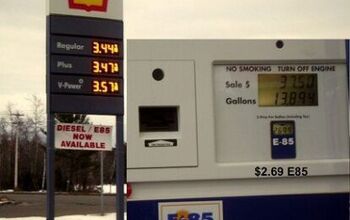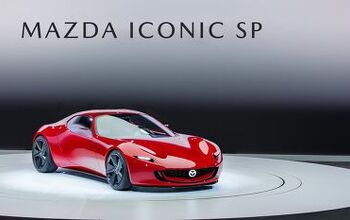Automakers Sue To Stop E15 Ethanol Blends
When oil and food industry groups sued to roll back the EPA’s ruling allowing E15 ethanol blends in 2007 and later model-year cars, we concluded
the political tail has wagged the scientific dog on ethanol ever since the farm lobby realized that ethanol could be the next corn syrup. With any luck, this lawsuit could just be the point at which science re-asserts itself.
The missing link: the automakers. Though auto manufacturers have been slowly climbing on board the anti-ethanol bandwagon, in no small part because large domestic OEMs like GM were once closely allied with the ethanol industry, it seems that the coalition to stop E15 is now complete. A new group known as the Engine Products Group, comprised of the Alliance of Automobile Manufacturers, The Association of International Automobile Manufacturers, the National Marine Manufacturers Association, and the Outdoor Power Equipment Institute, has filed a new petition to block the EPA’s E15 ruling.
According to a press release
The petition challenges the ability of EPA to grant a partial waiver for three specific reasons.
- The Clean Air Act does not authorize EPA to issue any “partial waiver” decisions,
- EPA’s own statute passed by Congress in 2007 states that fuels can’t be approved for the market that could cause any failures. Yet, E-15 has been shown to adversely affect engines in non-road products and later model year vehicles, cause emission failures and increase air pollution due to misfueling. Further, administrative records fail to demonstrate that even new model year motor vehicles (other than “flexible fuel vehicles”) would not be damaged and result in failures when run on E-15, and
- The testing, upon which EPA made its decision, was put in the administrative record too late to permit meaningful comment or scrutiny from concerned groups and stakeholders.
Another concern? With E15 approved only for vehicles built after 2007, there are no safeguards to prevent E15 fueling in pre-2007 vehicles. A spokesman explains
While all members of the EPG have and continue to support the development and use of safe and sustainable alternative fuels, the action EPA has taken to permit E-15 to be sold as a legal fuel, even if limited only to certain products, will have adverse consequences for the environment and consumers. A partial waiver, by its nature, necessarily will result in the misfueling of products not designed or tested for E-15 use
The response, from pro-ethanol lobbying group Growth energy:
The scientific evidence demonstrates clearly that E15 is safe not only for newer vehicles – the 2007 and newer approved already by EPA this year – but also for all passenger cars and trucks on the road today. We support the EPA decision to grant the waiver for 2007 and newer vehicles, and we look forward to EPA’s action on 2001 to 2006 model year vehicles. Concerns about misfueling are premature, as EPA is drafting a robust labeling rule and will conduct a vigorous public education campaign, and we are confident that the process will be successful.”
And last but not least, there’s a little delicious irony in this brewing battle. If the EPA’s E15 waiver is struck down by the courts, the imminent renewal of the ethanol subsidy package will simply have the ethanol industry bouncing off the “blend wall” all over again. It’s 2008 all over again!
More by Edward Niedermeyer
Latest Car Reviews
Read moreLatest Product Reviews
Read moreRecent Comments
- Kjhkjlhkjhkljh kljhjkhjklhkjh A prelude is a bad idea. There is already Acura with all the weird sport trims. This will not make back it's R&D money.
- Analoggrotto I don't see a red car here, how blazing stupid are you people?
- Redapple2 Love the wheels
- Redapple2 Good luck to them. They used to make great cars. 510. 240Z, Sentra SE-R. Maxima. Frontier.
- Joe65688619 Under Ghosn they went through the same short-term bottom-line thinking that GM did in the 80s/90s, and they have not recovered say, to their heyday in the 50s and 60s in terms of market share and innovation. Poor design decisions (a CVT in their front-wheel drive "4-Door Sports Car", model overlap in a poorly performing segment (they never needed the Altima AND the Maxima...what they needed was one vehicle with different drivetrain, including hybrid, to compete with the Accord/Camry, and decontenting their vehicles: My 2012 QX56 (I know, not a Nissan, but the same holds for the Armada) had power rear windows in the cargo area that could vent, a glass hatch on the back door that could be opened separate from the whole liftgate (in such a tall vehicle, kinda essential if you have it in a garage and want to load the trunk without having to open the garage door to make room for the lift gate), a nice driver's side folding armrest, and a few other quality-of-life details absent from my 2018 QX80. In a competitive market this attention to detai is can be the differentiator that sell cars. Now they are caught in the middle of the market, competing more with Hyundai and Kia and selling discounted vehicles near the same price points, but losing money on them. They invested also invested a lot in niche platforms. The Leaf was one of the first full EVs, but never really evolved. They misjudged the market - luxury EVs are selling, small budget models not so much. Variable compression engines offering little in terms of real-world power or tech, let a lot of complexity that is leading to higher failure rates. Aside from the Z and GT-R (low volume models), not much forced induction (whether your a fan or not, look at what Honda did with the CR-V and Acura RDX - same chassis, slap a turbo on it, make it nicer inside, and now you can sell it as a semi-premium brand with higher markup). That said, I do believe they retain the technical and engineering capability to do far better. About time management realized they need to make smarter investments and understand their markets better.


































Comments
Join the conversation
There actually isn't any problem in making new cars E15 compatible. There isn't a whole lot of difference between E15 and E10. Not a difference that matters, anyway. The big issue is what automakers are going to do about all those "2007" cars that the EPA is stating are categorically "safe" with ethanol. Some of which are patently not. But the EPA can't mandate a fuel blend only for 2010 and up cars... that won't make much sense to retailers.
Stop Ethanol Fuel Production!!! There are a billion starving people in the world and we are just using it to make low-rate fuel for cars. Enough! We have to put more effort into looking for other fuel sources. But of course, Big Oil companies and the people they pay are not in a rush... Because they have the upper hand and they want to keep it that way.